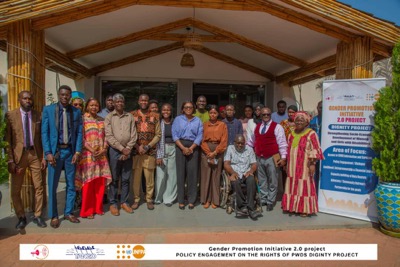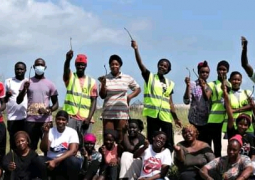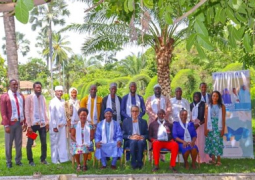
This, officials believe, would help in addressing inequalities some of these people they face in society.
Funded by the United Nations Population Fund, the project dubbed “Dignity Project”, also seeks to influence enforceable laws and policies, thereby promoting the full participation of disabilities in health, recreation, education among others.
The launch of this ambitious project held Dunas in Senegambia, attracted key stakeholders, National Assembly Members, officials of National Human Rights Commission, members of Gambia Federation of Disabilities and Civil Society Organisations.
Elsie Macauley, president of YASSS, recalled that over the years, PLWD have lived in a constant state of poverty and fear, as their fundamental human rights have been overlooked, most especially their basic needs.
“Persons Living With Disabilities constantly experienced social exclusion at an early age with tight restrictions, discriminations in severe instances and are subjected to verbal and physical abuse mostly by parents or close relations.”
He revealed that in The Gambia, the overall prevalence rate of disability is 1.2%, according to the 2013 census, with 6.3% and 6.1% males and 6.0% and 6.4% females of Persons Living With Disability between the ages of 15 and 19 years and 20 to 24 years respectively.
“7.5% of persons with disabilities aged 25 to 29 years are female and they have limited access to job opportunities and are left behind when it comes to basic social service provisions. One in five young women aged 15 to 19% are currently in union compared to less than 1% of men in the same age group.”
She pointed out that disability inclusion is critical in achieving sustainable development goals and global health priorities to achieve health for all, reduce inequality, and promote dignity in the community.
Thus, he underscored the need to build the capacity of other stakeholders in local communities so as to strengthen the inclusion and participation of women and girls with disabilities in decision-making and access to health care, education, and opportunities.
Michael Ambayo, UNFPA representative noted that his organisation recognizes that women and girls with disabilities in The Gambia face significant barriers in accessing sexual and productive health and information during normal times and during times of disasters.
Thus, he acknowledged that a lot of approaches have been put in place to see to it that there is always an inclusive health service provided for all persons, saying there is always community outreach, which is well-programmed to address all challenges for persons with or without disabilities.
He disclosed that new policies are also in place to advocate for the rights of all persons, more so women and girls, not leaving out the youth and reiterating that UNFPA also recognises that education is a fundamental right and is a critical factor in empowering women which, if not accessed, will impact their rights.
The project, he added, will also promote autonomy and integrity, which provides women and girls with the knowledge and skills to make informed decisions about their sexual health. It will also strengthen poverty reduction through decent work, entrepreneurship, counseling, mentorship, capacity-building training, and livelihood skills development for women and girls with disabilities.





